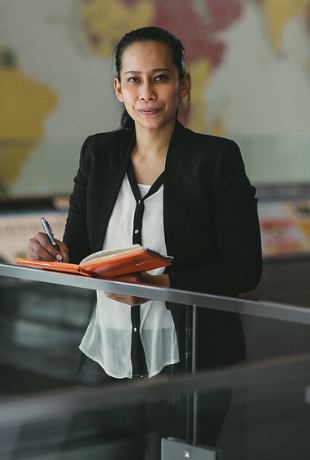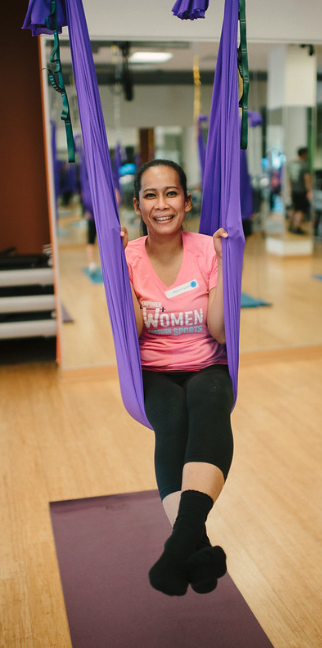
In junior high, Hanna became interested in soccer. She didn’t have a lot of opportunities to play herself, so she watched it on television and became enthralled. In 1994, the World Cup took place in the United States, on the opposite side of the world and in a different time zone. Her parents had forbidden Hanna to watch these late-night games for fear that she would not be rested for school. Against her parents’ wishes, Hanna snuck out of her room whenever she could to watch the games. When her parents found out, they confronted her, but Hanna knew that she could keep her grades up and promised to prove it to her parents.
Hanna demonstrated that she could balance her love for sport and school, and she soaked in all that she could while watching the World Cup. She began to notice the people working on-site, watching them closely, wondering if there was a career for her inside that stadium. Having recently discovered that she had a knack for writing, Hanna decided then that she would pursue a career in sports journalism.

After graduating with a degree in journalism from the Institute of Social and Political Science in Jakarta, Hanna had her sights set on a job at Indonesia’s Koran Sindo. She knew in her heart that sports writing was her calling. As she sat at the editor-in-chief’s desk, her dream was within arm’s length, and she just needed to reach out and seize it. Hanna joined the paper as the only female sports reporter on the team, and has now covered some of the most prestigious soccer tournaments in the world, including the 2008 UEFA European Football Championship, the 2010 World Cup, and the 2012 UEFA Champions League Final. She has also conducted interviews with many former soccer champions, from Franz Beckenbauer and Mario Kempes to Xavi Hernández and Alessandro del Piero.
While covering the World Cup in South Africa in 2010, Hanna had an experience that would change the way she thought about women in sports journalism. As she waited in line for tickets at a media center, a male sports journalist grabbed Hanna by the shoulder, physically moving her backwards, and took her place in line. Even worse, no one who saw it happen stood up for her. Furious and disappointed that this behavior was deemed acceptable, Hanna felt compelled to do something about it. Partnering with the US Embassy, she launched a campaign aimed at aspiring female journalists in Indonesia’s universities. “Every time we visit a campus to speak,” she says, “I always ask the women: ‘Do you want to be sports journalists?’ They raise their hands, but they’re not so optimistic about the future. In Indonesia, you only see women presenting quizzes and games. They don’t think they can compete with male journalists to cover the big tournaments.” Hanna knew they could, and she set out to help them.

In 2015, Hanna was chosen to participate in the Global Sports Mentoring Program (GSMP). She traveled to Burbank, California, where she was paired with Kimberly Wilson, the vice president of affiliate marketing for Disney and ESPN Media Networks. Hanna and Kimberly bonded over being women in a male-dominated field, where hearing the word “no” was commonplace. “When young women are told no,” Hanna says, “they should take that as a trigger to pursue their dreams and achieve their goals.” Kimberly agrees, saying, “A no to me is more a reflection on the person saying no than it is on my ability to do what it is I’m trying to do.”
Hanna’s GSMP experience reinforced her belief that young women who want to be journalists need mentors and role models. It also helped her in the areas where she felt she needed the most improvement: leadership and decision-making skills. If Hanna was going to blaze a trail for other women to follow, she was going to have to be brave, take more responsibility, and forge partnerships to further her cause.
Since returning to Jakarta from participating in the GSMP, Hanna has launched multiple campaigns related to women and sports. She has engaged with the US embassy on initiatives like the Public Diplomacy Small Grants Program for journalists, which aims to deepen “diplomatic and people-to-people ties between the US and Indonesia through programming that highlights shared values and promotes bilateral cooperation.” She also moved forward with a program much like the one she started pre-GSMP, using embassy grants to reach even more people this time and creating follow-up programs that could measure the impact of the campaign. Now, the Empowering Women through Journalism program has spread across the country and involves numerous universities. Hanna has also found partners in the Australian Embassy and the Australian Broadcasting Corporation (ABC), which have helped her organize a number of training sessions for female sports journalists in both Jakarta and Sydney.
Hanna’s growing network of like-minded women in media collaborated to create a female sports journalist forum they call iWINS (Indonesian Women in News and Sports). “I always wanted to address the gender imbalance in my country by increasing the numbers and visibility of girls and women in the sports media industry,” she says. “Through iWINS, I can deliver my message more effectively because I have partners in Indonesia’s female sports journalists. They share my concerns and we are working toward the same goals.”
Although Hanna is now the Deputy Editor-in-Chief at the Koran Sindo, she says “please call me a sports journalist—that is what I will always be.” She adds, “My journey proves that women have a place in the media industry, even though it is still a male-dominated field.” Hanna’s activism doesn’t stop there. During the COVID-19 pandemic, she became concerned about the increase in mental health issues affecting women. Hoping to find a way to help ease some of this through writing, she created Risala, a campaign named after the Arabic word for “message.”
Hanna Fauzie continues to push forward for Indonesia’s women, determined to become the mentor they need.